GREENEVILLE – Environmental stewardship and civic engagement were front and center at Tusculum University Saturday, March 19, as faculty and students participated in a statewide event focused on tree planting.
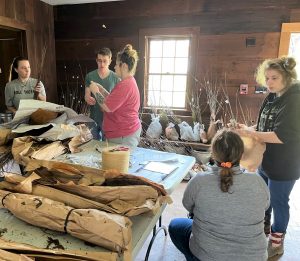
Left to right, Tusculum students Taylor Floyd, Andrew Medeck, Madison Chastain and Sarah Fillers and, right, community volunteer Taylor Renner work on orders.
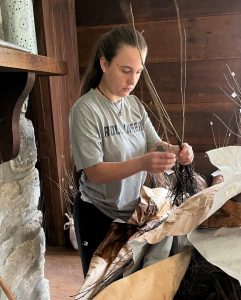
Tusculum student Taylor Floyd works on an order.
The Doak House Museum was buzzing with activity, with the facility serving as the distribution point for about 1,200 saplings provided to about 100 community members. The Tennessee Environmental Council sponsored Tennessee Tree Day across the Volunteer State so community members could acquire native trees for planting.
In harmony with the event, Tusculum faculty members planted about 50 trees near the Paul E. Hayden Educational Wetland and along College Creek, both of which are on the edge of campus. Faculty and students, joined by Dr. Scott Hummel, Tusculum’s president, also spent the day performing additional maintenance and clearing along a new trail the university created between the wetland and the Doak House.
“Participating in this event was a perfect fit because of the importance we place on civic engagement and the abundant natural resources on campus,” Dr. Hummel said. “Tennessee Day Tree Day positively impacts the community’s quality of life, and it provides an outlet for us to expand our robust efforts to preserve, protect and promote the environmental assets on our grounds. I am proud of our faculty and students for embracing the value of this event.”
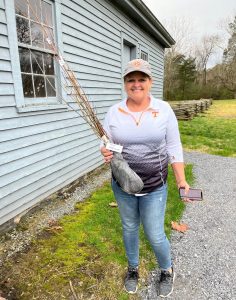
Community member Caryn McDermott picks up her order.
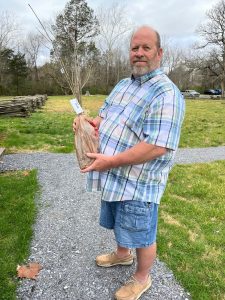
Community member Phillip Archer collects his order.
The Tennessee Environmental Council sought to engage about 10,000 volunteers to plant 75,000 native trees in in the state. Dr. Conor Keitzer, assistant professor of natural sciences at Tusculum, who collaborated with the council, said the event held at the university was a success.
Dr. Keitzer said trees are beneficial because they lessen erosion, provide food and habitat for wildlife and make people feel better. He and Dr. Susan Monteleone, associate professor of biology, said trees also reduce carbon in the air by absorbing it, which helps fight climate change.
Students played a prominent role in the event, sorting all of the saplings and placing the ones for each community member’s order in newspaper. Community members then came to the academy building at the Doak House to pick up their saplings from the students.
While that activity was taking place, faculty members and other students planted saplings on campus. Jordan Baker, assistant professor of biology, said they focused in the wetlands area on bald cypress, which is typically found near water to reduce erosion from loss of vegetation. At the Doak House, they planted wild plums, redbuds and dogwoods, which produce beautiful blooms in the early spring and provide food and habitat for wildlife, he said.
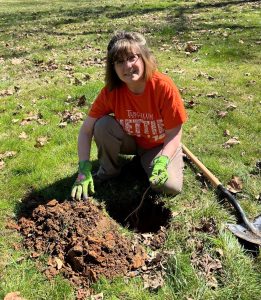
Dr. Susan Monteleone, a Tusculum University faculty member, plants a sapling near the Doak House Museum.
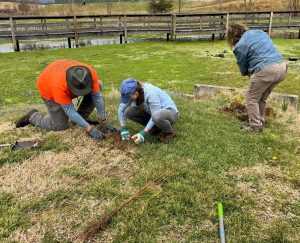
Left to right, Tusculum University faculty members Jordan Baker, Kelsey Trom and Dr. Susan Monteleone plant trees near the Paul E. Hayden Educational Wetland.
Baker explained that planting native trees – those found in Tennessee and the Southeast – is important.
“To keep an ecosystem stable, you try to plant a species that has been here instead of introducing a new one,” he said. “Instability in anything is not helpful, so we have chosen trees that will allow us to achieve our goals and not disturb the ecosystem that has naturally developed.”
The trail work performed Saturday is a continuation of the extensive project completed by the Tusculum family and community members to create another outlet for recreation on campus. The trail, which has a couple of branches, enables users to enjoy the outdoors, exercise and experience beautiful views.
A person can enter the trail across Gilland Street from the wetland and the university’s Facilities Management Department office or near the Doak House.
The group of faculty and students who participated Saturday, cleared additional areas and provided valuable maintenance, said Dr. Peter Noll, associate professor of public history and museum studies. He said others entered waterways along the trail to remove garbage and other items that did not belong there.
To learn more about Tennessee Tree Day, please visit https://www.tectn.org/tennesseetreeday.html. More information about the university is available at www.tusculum.edu.


